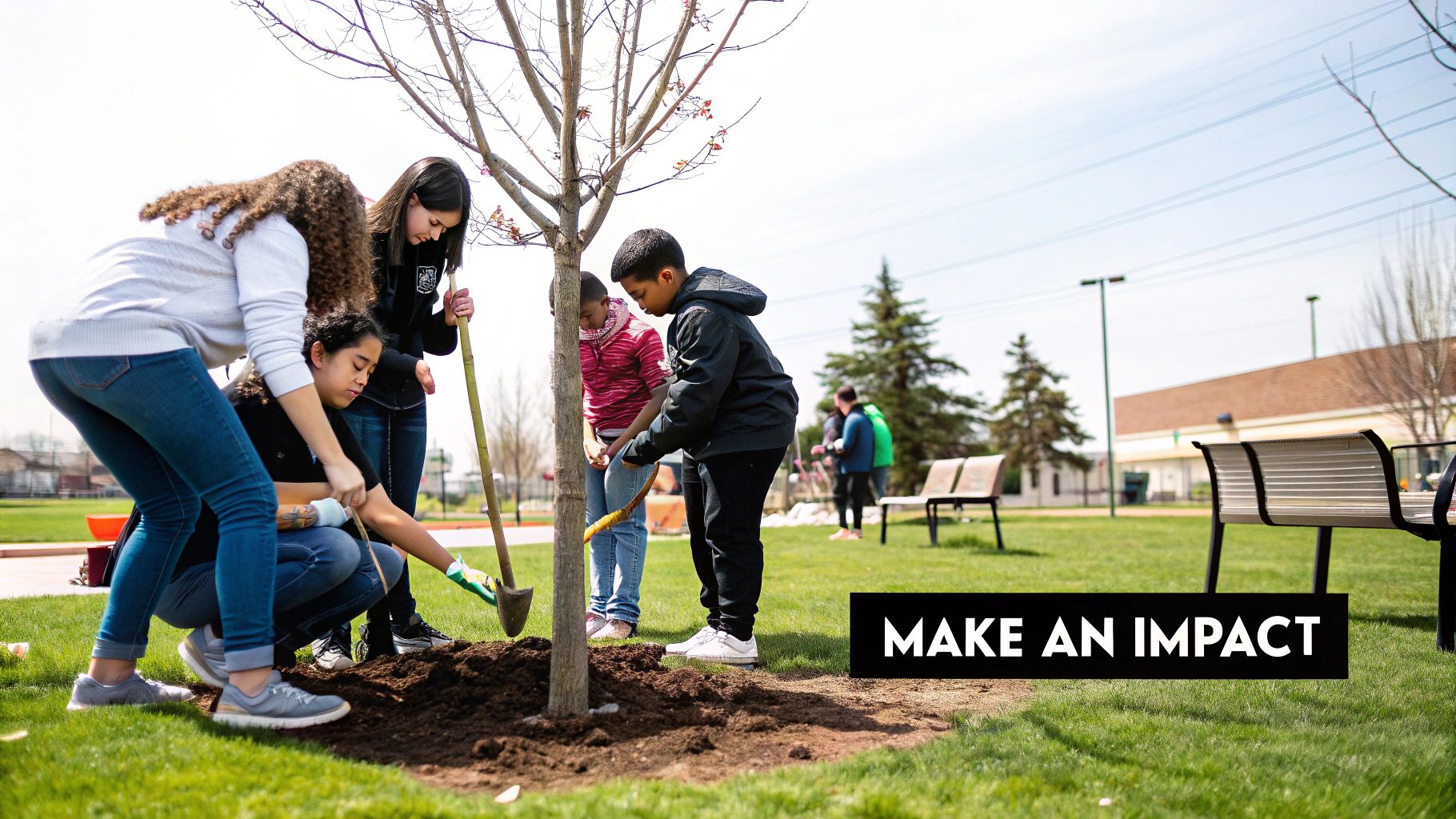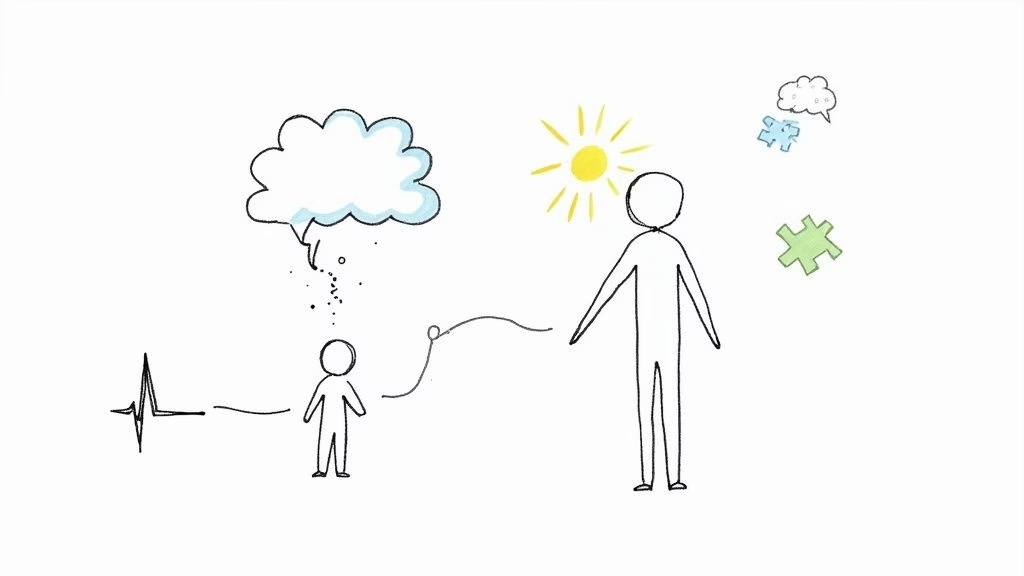Setting goals is more than just making a to-do list; it’s the engine that powers teen motivation and transforms their outlook. Often, motivation works in one of two ways. Many teens operate on ‘away-from’ motivation, driven by a need to escape stress, avoid a bad grade, or prevent an argument. This reactive state is exhausting and ultimately unsustainable, leading to burnout and procrastination.
Meaningful goals for teenagers flip this script entirely, creating powerful ‘towards’ motivation. This positive force isn’t about running from something negative; it’s about moving toward an exciting, self-defined future. It’s the difference between studying to avoid failure and studying to master a subject for a future career. Having a clear, positive goal is the best way to kickstart this type of motivation. It channels energy toward something exciting in our lives instead of just pushing us away from stress. This proactive mindset replaces anxiety with purpose and turns daunting tasks into achievable steps.
This article provides a structured guide to setting these ‘towards’ goals across eight critical areas of life, from academic excellence and financial literacy to personal growth and community impact. We will explore specific, actionable strategies for each goal, alongside parenting tips to foster support and resources to manage mental health effectively. The aim is to help teenagers build a foundation for success driven not by fear, but by a clear vision of who they want to become.
1. Academic Excellence and Study Skills Development
Pursuing academic excellence is one of the most powerful goals for teenagers because it builds a strong foundation for future success. This isn’t just about getting straight A’s; it’s about mastering the process of learning. By developing effective study habits, you cultivate discipline, critical thinking, and time management skills that are valuable in college, careers, and life. This goal helps you move toward something positive, like a dream college or a fulfilling career, rather than just being motivated away from the stress of bad grades.

This proactive approach is championed by experts like Cal Newport, who emphasizes deep work over frantic, last-minute cramming. The idea is to work smarter, not just harder, which also helps reduce the anxiety and procrastination often linked to schoolwork.
How to Implement This Goal
To start, translate vague desires like “get better grades” into concrete actions.
- Set SMART Goals: Instead of “do better in math,” set a goal like “Achieve an 85% or higher on the next algebra test by studying for 45 minutes every Tuesday and Thursday and attending one tutoring session.”
- Use Proven Techniques: Experiment with methods like the Pomodoro Technique (25 minutes of focused work followed by a 5-minute break) to combat procrastination. Use active recall and spaced repetition apps like Anki for long-term retention.
- Track Your Progress: Keep a simple log of your study hours and test scores. Seeing your improvements, even small ones, provides a powerful motivational boost.
Parenting Tip: Help your teen break down large school projects into smaller, manageable tasks. This reduces overwhelm and makes it easier to start, which is a key strategy for overcoming procrastination. Celebrate the completion of milestones, not just the final grade.
For many teens, the pressure to perform well can trigger significant stress. If you find that high-stakes exams are a major source of worry, it’s crucial to build coping strategies. You can discover powerful techniques to manage this pressure by learning how to overcome test anxiety.
2. Physical Fitness and Health Optimization
Establishing healthy physical habits is a critical goal for teenagers because it directly impacts mental clarity, emotional stability, and overall well-being. This isn’t just about athletic performance or appearance; it’s about building a sustainable lifestyle that includes regular exercise, mindful nutrition, and adequate rest. By prioritizing physical health, you develop discipline, resilience, and a positive relationship with your body, creating energy that fuels success in all other areas of life. This goal provides motivation toward feeling strong and confident, rather than just being motivated away from poor health.

This holistic approach is supported by countless studies showing a strong link between physical activity and reduced symptoms of anxiety, stress, and depression. Fitness influencers and apps like MyFitnessPal have popularized the idea of tracking progress, but the core principle is simple: consistent effort leads to profound mental and physical benefits, helping you manage school pressures and procrastination more effectively.
How to Implement This Goal
Turn the broad ambition of “getting healthier” into a manageable, structured plan.
- Set Progressive Goals: Instead of a vague goal like “get fit,” aim for something specific like “run a 5K in three months by following a beginner training plan” or “increase my push-ups from 5 to 15 in six weeks.”
- Find Activities You Enjoy: The best exercise plan is one you’ll stick with. Experiment with team sports, hiking, dancing, martial arts, or weightlifting to find what genuinely excites you and keeps you engaged.
- Focus on How You Feel: Track metrics like increased energy levels, better sleep quality, and improved mood. Focusing on these internal benefits provides deeper motivation than focusing solely on external changes like weight or appearance.
Parenting Tip: Support this goal by modeling healthy behaviors and focusing on health-centric language rather than weight-centric discussions. Encourage family activities like weekend hikes or cooking healthy meals together. Fostering a positive environment is key to helping your teen build a lifelong foundation of wellness.
3. Career Exploration and Skill Building
Actively exploring career paths is one of the most empowering goals for teenagers, transforming the abstract question of “What do you want to be?” into a tangible, hands-on experience. This goal moves beyond simple career quizzes; it’s about intentionally building a portfolio of real-world skills and experiences. By doing this, you’re motivated toward an exciting future you can envision, rather than just being motivated away from the stress of making the “wrong” choice after graduation. This proactive exploration builds confidence and provides a clear sense of direction.
This approach is championed by career development programs like DECA and platforms such as LinkedIn Learning, which emphasize that early, practical engagement is key. Getting a taste of different fields helps you make informed decisions about college majors and future jobs, reducing the anxiety of the unknown and connecting your current schoolwork to your future aspirations.
How to Implement This Goal
Turn your curiosity about potential careers into a concrete plan of action.
- Seek Hands-On Experience: Don’t just read about a job; experience it. Shadow a family friend who is a graphic designer for a day, volunteer at a local animal shelter to see if veterinary science is for you, or get an internship at a tech startup.
- Build Tangible Skills: Start small projects that build valuable skills. Code a simple app, start a photography business for local events, or create a YouTube channel about a topic you’re passionate about. These projects demonstrate initiative and can even generate income.
- Document Everything: Keep a running log of your experiences, the skills you learned, and the professionals you met. This documentation will be invaluable for college applications, resumes, and future job interviews.
Parenting Tip: Encourage informational interviews. Help your teen brainstorm a list of people in your network who work in fields they find interesting. A 15-minute conversation can provide invaluable insights and open doors to future opportunities.
Exploring your future options is a critical step in personal development. To build a more comprehensive roadmap for your professional life, you can find valuable insights by reviewing a guide to career planning for college students.
4. Financial Literacy and Money Management
Developing financial literacy is one of the most empowering goals for teenagers, transforming abstract concepts like budgeting and saving into tangible life skills. This isn’t just about earning money; it’s about learning how to manage it effectively to build a secure future. By understanding concepts like budgeting, saving, investing, and credit now, you gain the confidence and competence to achieve financial independence later, whether that means paying for college, starting a business, or simply living without money-related stress.

This proactive approach is championed by figures like Dave Ramsey and Robert Kiyosaki, who emphasize building positive financial habits early. The goal is to move toward financial freedom and opportunity, rather than being motivated away from the fear of debt or financial instability. This positive framing makes the learning process feel exciting instead of restrictive.
How to Implement This Goal
Turn the broad goal of “be good with money” into specific, manageable actions.
- Create a Simple Budget: Use an app like Greenlight or even a simple spreadsheet to track your income (from an allowance or part-time job) and expenses. Start with the 50/30/20 rule: 50% for needs, 30% for wants, and 20% for savings.
- Open a Savings Account: Automate your success. Set up a dedicated savings account and arrange for a small, automatic transfer from your checking account each week or month. Watching your savings grow, even slowly, is a powerful motivator.
- Learn the Basics of Investing: You don’t need a lot of money to start. Use a platform like Acorns to invest spare change or read an age-appropriate book on index funds. The goal is to understand the power of compound interest early.
Parenting Tip: Be transparent about your own family’s budgeting and financial decisions (within appropriate boundaries). Involving your teen in discussions about saving for a vacation or managing household bills demystifies money and provides real-world learning.
5. Social Skills and Relationship Building
Beyond academics and individual achievements, one of the most vital goals for teenagers is learning to connect with others authentically. Developing strong social skills and emotional intelligence is not about being the most popular person in the room; it’s about building meaningful, supportive relationships with peers, family, and mentors. This goal helps you master communication, empathy, and social confidence, which are essential for navigating college, the workplace, and life’s complex social landscapes.
This focus on connection moves you toward the positive feelings of belonging and mutual respect, a far more powerful motivator than simply trying to avoid loneliness or social anxiety. The principles championed by Dale Carnegie in How to Win Friends and Influence People remain timeless: showing genuine interest in others builds the strongest bonds. This approach transforms social interactions from a source of stress into an opportunity for growth and fulfillment.
How to Implement This Goal
Start by turning the abstract idea of “being more social” into small, manageable actions.
- Practice Active Listening: In your next conversation, make it a goal to truly listen without planning your response. Ask open-ended follow-up questions to show you’re engaged. For example, instead of just nodding, say, “That sounds interesting, can you tell me more about why you chose that?”
- Join a Group Aligned with Your Interests: Whether it’s a debate team, a coding club, or a community volunteer group, joining an activity provides a natural way to meet people with shared passions. This creates an instant foundation for connection.
- Seek and Offer Support: Intentionally check in on a friend or ask a trusted mentor for advice. Building relationships is a two-way street of giving and receiving support, which strengthens your bonds and your own resilience.
Parenting Tip: Create opportunities for your teen to host friends or participate in group activities. At home, model healthy communication and conflict resolution. Discussing how to handle disagreements constructively builds crucial life skills.
Developing these skills is an active process. If you want to explore structured ways to build your confidence and communication abilities, you can find inspiration in a variety of social skills activities for teenagers.
6. Creative Expression and Artistic Development
Engaging in creative expression is one of the most fulfilling goals for teenagers, offering a powerful outlet for emotions and ideas that might otherwise be difficult to articulate. This isn’t just a hobby; it’s a way to cultivate innovation, problem-solving skills, and a unique personal identity. Whether it’s through painting, writing music, or creating digital art, artistic development provides a space to explore your inner world and build confidence by bringing something new into existence. This goal propels you toward self-discovery and fulfillment, a much healthier motivator than simply trying to escape the stress of daily routines.
This process of creation strengthens neural pathways and enhances cognitive flexibility, skills that benefit you across all areas of life, including academics. Platforms like SoundCloud, Wattpad, and DeviantArt have shown that young creators can build audiences and even careers from their passions. This proves that investing time in your art is a valuable pursuit that builds both personal and potentially professional skills.
How to Implement This Goal
To turn a creative interest into a tangible goal, you need structure and a willingness to share your work.
- Set Aside Regular Practice Time: Consistency is more important than intensity. Schedule specific, non-negotiable blocks of time for your art, such as “practice guitar for 30 minutes every day after school” or “write 500 words for my story every Saturday morning.”
- Share Your Work for Feedback: Overcoming the fear of sharing is a huge step in artistic growth. Start small by showing your work to a trusted friend or family member. As you gain confidence, consider platforms like Instagram, TikTok, or online forums dedicated to your craft.
- Connect with Other Artists: Find a community to stay inspired and accountable. Join a school club, a local workshop, or an online group of fellow creators. Collaboration and shared passion are powerful motivators.
- Document Your Progress: Keep a portfolio, a blog, or even a private social media account to track your development. Seeing how far you’ve come over a few months can be incredibly encouraging and help you push through creative blocks.
Parenting Tip: Support your teen’s creative pursuits, even if you don’t fully understand them. Provide the necessary supplies, show genuine interest in their work, and encourage them to experiment without fear of failure.
7. Personal Development and Character Building
While academic and career goals are vital, focusing on personal development is one of the most transformative goals for teenagers. This goal is about looking inward to build character, understand your values, and develop emotional resilience. It’s the process of becoming the person you want to be by cultivating a strong moral compass, self-awareness, and a growth mindset. This proactive approach helps you build motivation toward becoming a more capable and confident individual, rather than just being motivated away from feelings of inadequacy or confusion.
This focus on internal growth is championed by authors like Stephen Covey in The 7 Habits of Highly Effective Teens. The core idea is that personal victories, like developing integrity and self-discipline, precede public victories. By building a strong inner foundation, you equip yourself to handle external challenges with greater calm and confidence, whether it’s bouncing back from a failure or navigating complex social situations.
How to Implement This Goal
Translating abstract ideas like “build character” into daily habits is key to making progress.
- Define Your Core Values: What principles are most important to you? Honesty, compassion, perseverance? Write down 3-5 core values and review them weekly to see if your actions align with them.
- Practice Daily Reflection: Dedicate just 5-10 minutes each day to mindfulness or journaling. A gratitude journal, where you list three things you’re thankful for, can shift your perspective and reduce stress.
- Seek and Reflect on Feedback: Ask a trusted teacher, coach, or family member for constructive feedback on one of your strengths and one area for growth. This practice builds humility and self-awareness.
Parenting Tip: Create a safe space for open conversations about emotions and challenges. Validate your teen’s feelings without judgment. Resources like the National Institute of Mental Health (NIMH) and organizations like The Jed Foundation offer valuable information and support for teen mental health.
Developing your character is an ongoing journey, not a destination. For teens navigating the pressures of school and social life, building this inner resilience is crucial. If you find yourself struggling with motivation or procrastination, strengthening your personal foundation can provide the clarity and drive you need. You can find more strategies for this by exploring resources on how to help a teenager with no motivation.
8. Community Service and Social Impact
Engaging in community service is one of the most fulfilling goals for teenagers, shifting the focus from personal achievement to collective well-being. This goal involves volunteering your time and skills to make a positive impact, fostering empathy, leadership, and a strong sense of civic responsibility. Instead of being motivated away from negative feelings like boredom or self-preoccupation, this goal pulls you toward a positive purpose, like helping others and improving your community.
This approach is championed by organizations like the National Honor Society and Habitat for Humanity, which emphasize that contributing to society builds character and perspective. By tackling real-world problems, you gain practical skills and a deeper understanding of social issues, which can reduce feelings of helplessness and boost your motivation in other areas of life.
How to Implement This Goal
To get started, find a cause that genuinely excites you and turn that passion into action.
- Find Your Cause: Instead of just signing up for anything, choose a cause that aligns with your values. If you love animals, volunteer at a local shelter. If you’re passionate about the environment, join a park cleanup initiative.
- Start Small and Collaborate: You don’t need to commit 20 hours a week. Start with a single event, like a weekend food drive or a charity 5k. Partner with friends to make the experience more social and enjoyable, which also helps with accountability.
- Track Your Impact: Keep a journal of your volunteer hours and reflect on your experiences. Note what you learned and how it felt to contribute. This documentation is not only great for college applications but also reinforces your sense of accomplishment and purpose.
Parenting Tip: Encourage this goal by volunteering as a family or helping your teen research local organizations. It’s an excellent way to help your teen build confidence and perspective beyond academics, providing a healthy outlet and teaching them that their actions can create meaningful change.
Teen Goals: 8-Point Comparison Guide
| Aspect | Academic Excellence and Study Skills | Physical Fitness and Health Optimization | Career Exploration and Skill Building | Financial Literacy and Money Management | Social Skills and Relationship Building | Creative Expression and Artistic Development | Personal Development and Character Building | Community Service and Social Impact |
|---|---|---|---|---|---|---|---|---|
| Implementation Complexity | Moderate – structured study habits needed | Moderate – regular routines and planning | High – requires coordination and real-world access | Moderate – learning concepts and practicing | Moderate – requires consistent practice | Moderate to high – skill development over time | Moderate – ongoing self-reflection practiced | Moderate to high – commitment and organization |
| Resource Requirements | Minimal – study materials and time | Moderate – exercise equipment and nutrition | Variable – internships, mentors, and transport | Minimal to moderate – apps, accounts, and guidance | Minimal – social settings and communication opportunities | Variable – materials, lessons, and creative space | Minimal – journaling and mindfulness practices | Minimal to moderate – volunteering opportunities |
| Expected Outcomes | Improved grades and lifelong learning skills | Enhanced physical and mental health | Clarified career goals and professional skills | Financial independence and smart money habits | Better communication and strong relationships | Increased confidence and creative skills | Greater self-awareness and emotional resilience | Empathy, leadership skills, and social responsibility |
| Ideal Use Cases | Students aiming for academic success | Individuals improving health and wellness | Teens exploring future careers through experience | Teens preparing for financial independence | Teens building social confidence and networks | Teens pursuing artistic interests and talents | Those focusing on emotional growth and resilience | Teens wanting to impact their community positively |
| Key Advantages | Builds discipline and critical thinking | Boosts energy, confidence, and mental health | Provides real-world experience and networking | Prevents financial mistakes, builds wealth habits | Enhances interpersonal skills and leadership | Provides emotional outlet and boosts cognitive skills | Develops maturity and coping skills | Builds empathy and leadership, enhances college apps |
| Common Challenges | Risk of stress, burnout, and perfectionism | Time commitment and possible costs | Scheduling conflicts and geographic limits | Overwhelm, discipline, and investment risks | Challenging for introverts and requires effort | Expense and slow progress, competing priorities | Intangible progress and requires discipline | Time demands, emotional challenges, and logistics |
From Goals to Growth: Your Teen’s Next Steps
Navigating the teenage years can feel like trying to solve a complex puzzle, but setting clear, meaningful goals provides the picture on the box. Throughout this article, we’ve explored a comprehensive roadmap of goals for teenagers, touching on everything from academic excellence and financial literacy to personal development and social impact. These aren’t just items to check off a list; they are the foundational building blocks for a resilient, capable, and confident young adult.
The journey from goal-setting to achievement is where true transformation happens. It’s about more than just earning a good grade or saving a certain amount of money. It’s about building the habits, discipline, and self-awareness that will serve your teen for a lifetime. Mastering time management to study for a test also prepares them for college deadlines. Learning to budget for a desired item teaches them financial responsibility for future independence. Each small victory reinforces their ability to take control of their own future.
The Power of “Toward” Motivation
A crucial shift in perspective for many teens is moving from “away from” motivation to “toward” motivation. It’s common for teens to be driven by a desire to avoid negative consequences: studying to avoid a bad grade, cleaning their room to avoid an argument, or finishing homework to avoid stress. This “away from” motivation is rooted in anxiety and pressure, and it’s often unsustainable, leading to burnout and procrastination.
In contrast, the goals for teenagers we’ve discussed are designed to foster “toward” motivation. This is a powerful, positive force that pulls your teen forward.
- They don’t just study to avoid failure; they study toward mastering a subject they find fascinating or toward getting into their dream college.
- They don’t just exercise to avoid being unhealthy; they train toward joining the varsity team or feeling strong and energetic.
- They don’t just volunteer to fill a requirement; they contribute toward making a tangible difference in their community.
This forward-looking mindset transforms chores into choices and obligations into opportunities. It replaces the anxiety of avoidance with the excitement of pursuit, which is the ultimate key to conquering procrastination and building genuine, lasting motivation. As a parent, you can help facilitate this shift by framing conversations around the positive outcomes and personal growth associated with their goals, rather than just the negative consequences of inaction.
The path isn’t always linear, and that’s perfectly okay. There will be setbacks and moments of doubt. The real objective is to equip your teen with the tools to navigate these challenges, learn from their experiences, and keep moving forward. By embracing these goals, they are not just preparing for the future; they are actively creating it, one intentional step at a time.
If your teen is struggling to find this positive motivation or needs help turning their aspirations into actionable plans, personalized guidance can make all the difference. Andrew Petrillo Life Coaching specializes in helping teens and young adults build the clarity, confidence, and skills needed to achieve their goals. Consider scheduling a complimentary discovery call to see how a structured coaching program can unlock your teen’s full potential.



















